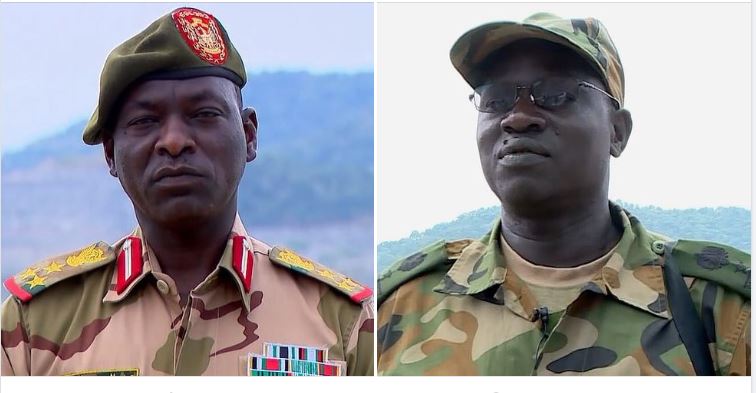
From Left: Brig. Gen. Abdelmejed Anis, Military Attaché in Sudanese Embassy in Addis Ababa, Lt. Col. Opul Cham Ojilu, the deputy military attaché in South Sudan Embassy - Credit: Ethiopian News Agency, Nov. 10, 2023
Military Attachés from different countries in Ethiopia visited the Great Renaissance Dam on Friday, November 10, 2023, according to the Ethiopian News Agency.
The state-owned media quoted the military commanders as saying the dam is of great importance for the development of Ethiopia, the region, and beyond.

They mentioned that the dam is a key tool for development and a symbol of pride for the Ethiopians.
The military commanders also stated that it is a project that will eradicate poverty and provide electricity to the country and its neighbours.
The Attaches include Brigadier General Abdelmejed Anis of the Sudanese Embassy, Lt. Col. Opul Cham Ojilu of the South Sudanese Embassy, and Lt. Col. Daniel Mike Juliet of the Canadian Embassy.
Others were Air Commodore Mackenzie Manfred of the Namibian Embassy, Col. Marco Poddi of the Italian Embassy, Brig. Gen. Shariful Islam of the Bangladeshi Embassy in Addis Ababa.
The Military Attaches were accompanied by Maj. Gen. Teshome Gemechu, Director of the Directorate of Defense Foreign Relations and Military Cooperation.
According to Ethiopian News Agency, Brigadier General Abdelmejed Anis, the Military Attache in the Sudanese Embassy in Addis Ababa said that the Dam is the pride of Africa as a whole not for Ethiopians only.
For his part, Lt. Col. Opul Cham Ojilu, the deputy Military Attaché in the South Sudanese Embassy in Addis Ababa said that South Sudan is one of the countries that will benefit from the dam.
During their visit, the Military Attaches also mentioned that they have observed that the water is flowing downstream countries properly, and this practically shows that the dam will not harm any country.
They have said that this will eliminate poverty and accelerate the economic integration of other countries.
The commanders also said that the dam would play an important role in promoting the economic growth of Ethiopia and other neighboring countries.
Lt. Col. Daniel Mike Juliet, the representative for military affairs of the African Union and Ethiopian Canadian Embassy said that the dam will generate renewable energy for the region.
Lt. Col. Juliet mentioned that Canada has a lot of experience in renewable energy development and Ethiopia is doing encouraging work in managing its water resources.

For his part, Air Commodore Mackenzie Manfred, the Military Attache in the Namibian Embassy in Addis Ababa said that the dam is a big project that Ethiopians are building with their own money for the future generation.




In the past, Sudan, which sits on the river between the two countries, has been taken to issuing dark warnings.
An advisor to the head of Sudan’s sovereign council, Lt-Gen Abdel Fattah al-Burhan, spoke of a water war “that would be more horrible than one could imagine” unless the international community helped find a solution.
Rewind 14 months and very different noises were coming from the capital, Khartoum.
In February 2020, Water Resources Minister Yasir Abbas talked about how the dam, Africa’s biggest hydroelectric plant, would benefit Sudan.
For its part, Ethiopia continues to try and reassure Sudan that the Gerd will not damage the country.
Dams have several uses
Dams do generate electricity, store water for crop irrigation and help to prevent floods.
They can also cause dispute and heartache—for example, over damage to the environment or the displacement of people whose homes are lost beneath dammed waters.
The construction of one on the Nile has sparked a quarrel between Egypt, Ethiopia and Sudan.
The Grand Ethiopian Renaissance Dam (GERD), costing $5bn, will be Africa’s largest hydroelectric-power project once fully operational later this decade.
Located on the Blue Nile in northern Ethiopia, upstream from Egypt and Sudan, it will produce 6,000 megawatts of electricity, twice as much as Ethiopia’s entire current output.
Even though the dam could give the region a big economic boost, officials from the three countries have failed to strike a deal on how it will be operated. And the Egyptian government has even considered bombing it. In January yet another round of virtual talks failed.
So why is the GERD so controversial?
Egypt fears that the dam will choke off the life-giving waters of the Nile.
It has good reason to worry. Some 95% of the water consumed by the country’s 115m people is drawn from the river.
Previous dams on the Nile have altered the floods and flow of sediments that the country relies on to grow food.
The Nile Waters Agreements of 1929 and 1959 granted Egypt and Sudan the right to use all of the water between them and gave Egypt the right of veto over upstream construction projects.
Ethiopia, which was left out of the agreements, does not recognise them, prompting the disagreement over the impact of the GERD.
Support Eye Radio, the first independent radio broadcaster of news, information & entertainment in South Sudan.
Make a monthly or a one off contribution.
Copyright 2024. All rights reserved. Eye Radio is a product of Eye Media Limited.